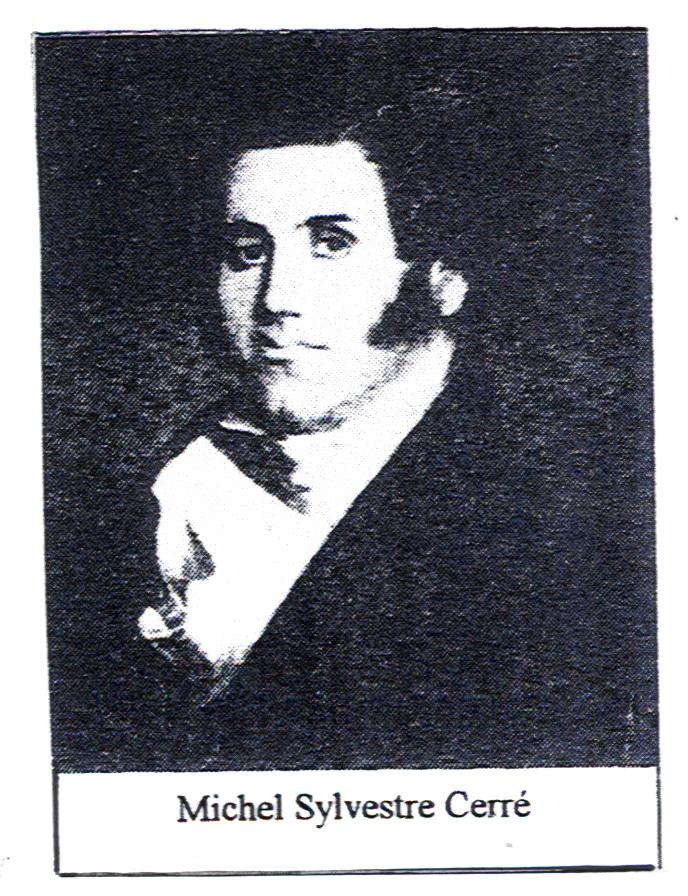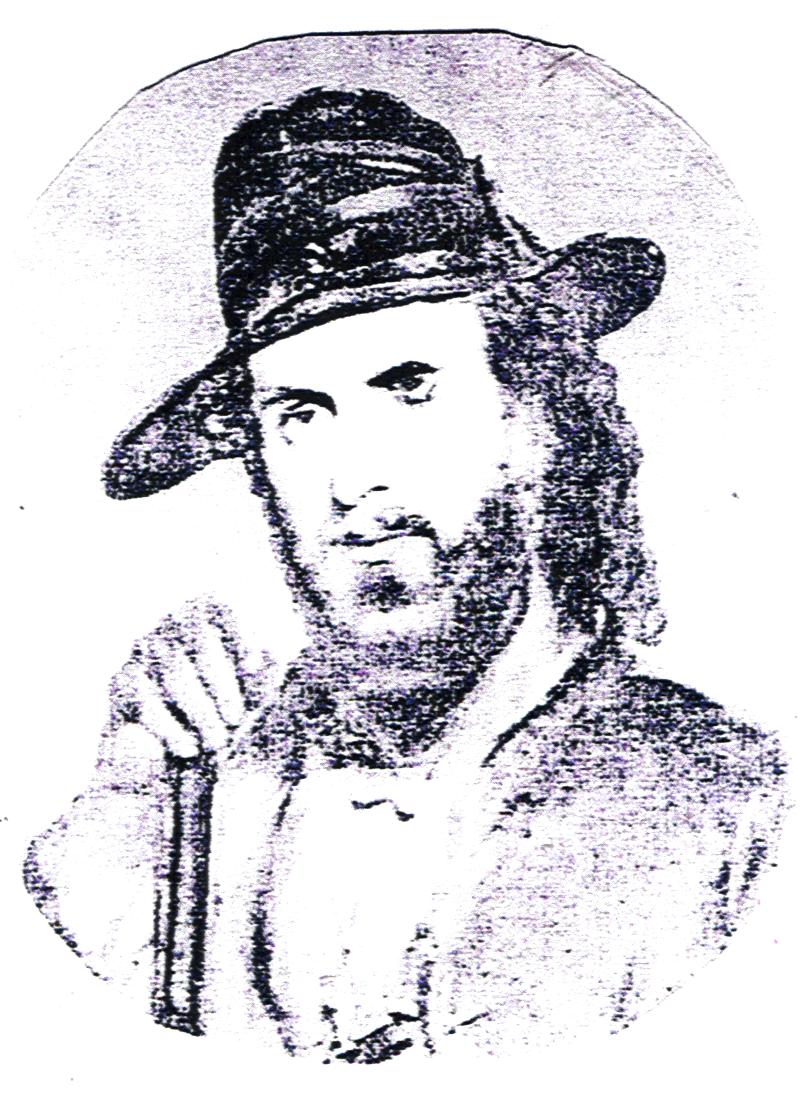BIRTH OF AMERICA BOOKS (tm)
TRAILS OF THE WHITE SAVAGES
REAL PEOPLE, TRUE STORIES
HISTORICALLY ACCURATE AND FUN TO READ
(They're written like novels with dialogue based on journals,
diaries and newspapers)
HISTORY AS IT HAPPENSä IN HIGH ACTION AMERICAN HISTORY BOOKS
"I've had 14 duels with a spate of war wounds in between."
Andrew Jackson
CHAPTER 37
THE THINNEST VENEER ..................WINTER 1831-32
 All partenaires of P. D. Papin &
Company had gotten responsible positions in the American Fur
Company after selling out to Astor's empire except for Michel Sylvestre Cerré.
All partenaires of P. D. Papin &
Company had gotten responsible positions in the American Fur
Company after selling out to Astor's empire except for Michel Sylvestre Cerré.
Though he was
well off, Michel had implored John Jacob Astor's staff for a worthy
task. When it seemed beyond hope, suddenly it had come!
He re-read
Alfred Seton's letter. Michel was to begin assembly of a 110 man expedition and 20
freight wagons in St. Louis! This grand land fleet would set out May 1,
1832 -- five days before Michel's 30th birthday. After being so long in the shadows of
his prominent family, what more could a young man ask to show his worthiness?
Seton's letter
said little about this Benjamin Bonneville. Though Michel was delighted Bonneville was born in France, only his Army career was
mentioned. Who was he? But Seton left no doubt that Cerré was to maintain the appearance of answering to
Bonneville. All reports Bonneville made to his superiors were to first be
reviewed for any commercial value they might have to AFC's fur interests.
Reports Cerré made to AFC about Captain Bonneville would be in
strict confidence. Astor's personal instruction was that no convict nor
sinister person be hired in the event the expedition's true sponsorship should
ever surface.
Michel Cerré vowed to search St. Louis for men, mules, wagons and
supplies immediately after the Blessed Christmas. Now his brother Gabriel, trading on the Missouri, and his sister Catherine Louise, married to his former partinenaire P.D.
Papin, would grasp the
magnitude of his stature, not from his words, but the funds that would fatten
his personal account.
Every man had to
grow into himself. With 30 staring him in the eyes like the black hearted bayou
snake it was, Michel
Cerré would don
himself like a greatcoat and march proudly into a grand new life.
****
Few places in
this world could feel colder than Washington, D.C. in the dead of winter.
Captain Benjamin Bonneville was keen to learn what the New Year 1832 held for
him. His task now was to hurdle bureaucratic barriers and keep his mission
headed West.
After months of
wrestling arcane instruments at West Point, he'd created the semblance of
competence with them, though it might not stand the scrutiny of a scientist. He
was a soldier -- not a bookworm.
He'd received
word to report to the White House. The mere hint that some perverse change
might bar his name from America's annals beside those of Lewis and Clark
chilled him more than the winds off the Potomac.
Bonneville
prayed Washington's internecine wars would not kill his expedition. The
bloodbath over re-chartering the United States Bank soaked the front page of
every newspaper. Some sided with Jackson, demanding an end to the
national menace. Others backed Bank President Nicholas Biddle. Bonneville knew
Astor was a Biddle man and vowed to walk wide of that political bog.
The White House
stood majestically in drifted snow. Bonneville knew he would always remember it
this way like a painting by the masters. He entered and started through the
armada paid to keep people from seeing the President -- even if they had an
appointment.
Unbeknownst to
Captain Bonneville, President Jackson had summoned a Philadelphia surgeon to
the White House who arrived the same hour as the good Captain's appointment.
Jackson's assistant directed Bonneville to the waiting area outside the President's
private office where he sat readying answers for all contingencies that might
hamstring his mission.
Inside the
President's office the renowned Dr. Harris of Philadelphia examined the
shirtless Andrew Jackson. "Mr. President, you are a mass of scars."
Jackson replied,
"I've had 14 duels with a spate of war wounds in between."
"Which scar
in your collection brings me here today?"
"As we
discussed by letter, it won't be Charles Dickinson's ball lodged against my
heart, though the Lord knows it pains me most. Today, Jesse Benton's ball must
be removed. Was in my left shoulder, but it's settled lower."
"This scar
is old."
"Nigh 20
years."
"I can't
feel the bullet, Mr. President. Where is it?"
Jackson elevated
his skinny arm. "Worked itself inside my arm to hang right there most
painfully."
"Whiskey,
Mr. President?"
Jackson's eyes
flared. "Would you have me making decisions for the nation in a befuddled
state?" Jackson gripped his walking stick and gritted, "Go
ahead."
Dr. Harris made
the incision, squeezed the President's arm and out popped a flattened ball. He
staunched the wound, then began suturing it with gut.
"Let me see
that ball," Jackson ordered, trying to feign that he didn't feel dizzy and
weak.
Depositing the
mangled bullet in Jackson's unsteady hand, the surgeon resumed stitching the
wound.
Jackson mused,
"Lead was a good deal flattened by striking my bone and looks somewhat
hackled around the edges. See my secretary for your fee."
After Dr. Harris
departed, President Jackson dressed, stifled his urge to kill the pain with a
jolt of liquor and had the Army officer ushered in as though nothing had
happened. "Sit down, Captain."
Bonneville eyed
the bloody towel on the floor by the President's desk, doffed his cap, inserted
it under his arm and saluted, "Captain Benjamin Lewis Eulalie Bonneville,
7th Infantry Regiment reporting as ordered, Sir!"
Andrew Jackson
couldn't resist returning the smart salute though himself clad as a
civilian. There was something precious about military tradition and the
men who practiced it. "Do sit down, Captain."
Bonneville sat
erectly.
"The 1818
Joint Occupation Treaty of Oregon with Britain is an infernal nuisance, but it
gives you the right to go where you wish up there. It's not enough to know
where the British are or what they are doing. I want to know what they are thinking! I want your estimate of the force necessary to take
Fort Vancouver. Are you remembering this, Captain?"
"Most
assuredly, Sir! I've never conversed with another President."
"Find out
how California is garrisoned and what it will take to reduce it. You
going there soon?"
"Joseph
Walker will go. He fought in your command at Horseshoe Bend with his brother
Joel and Sam Houston. Joseph also served as Sheriff of Independence,
Missouri, Sir."
"I remember
Joel Walker. He served under me in Florida as well. I can't place the
other Walker, though I remember Sam Houston most acutely."
"Joseph
Walker is a black-bearded behemoth of a man, though he was but a boy of 15 when
he served under you on the Tallapoosa River. Claims he still hasn't got his
Army pay."
Jackson laughed
at Bonneville's audacity in bringing that up. "Captain, you need to shield
your thought of the moment with clever subterfuge if you're to succeed as an
operative."
"I shall,
Mr. President, but I shall never be less than candid with my Commanding
Officers."
Andrew Jackson
chortled, "Then you'll likely spend a long time in grade as a
Captain!"
Bonneville
reddened, "About California, Sir. I will get Walker's passport and visa
before I leave Washington. What shall I do about Texas?"
"Absolutely
nothing!" Jackson snapped.
"You'll do
fur trapping to pay costs of this enterprise?"
"That's our
intention, Mr. President."
"Do not
ever contact me directly from the field. Channel your reports through the
Commanding General of the Army or the Secretary of War -- and by all that's
holy -- be careful with your reports. Stray paper is far more deadly than artillery
and every bit as apt to hit that at which it is not aimed."
"I
understand, Sir."
"Do you
really. We shall see, Captain. Good day, Sir."
****
Joe Walker led
his string of six handsome horses into the draw. They snorted and looked about,
eyes wide, ears flicking. When they did not graze right away, Joe looked up and
down the draw. He walked among them, patting them to quiet their stomping. He
sensed somebody was watching, but saw no one.
His mission to
find the Delawares just west of Fort Osage had turned to a hair shirt.
The weak winter sun was sink-ing into the rolling hills. Tracks of eight ponies
gouged the snow, but they'd circled again and fanned out. He decided to make
camp before it got too dark to find the best place to sleep.
Walker hobbled
his horses, then pounded the stakes for their 12 foot ropes deep into the hard
ground. They could graze on the tan grasses spearing through the snow. He knew
a man seeking company at night makes a fire, so he started one with dry wood
off his pack horse. Then he collected branches shed from the cottonwood, ash
and persimmon trees standing with slender mantles of snow along their limbs. He
strung the branches out to dry by his fire. New moccasin tracks barely visible
in the dark snow told him he was not alone. He waved toward his fire.
"Why you
follow us, Blackbeard?" asked the smallest of the several Delawares in the shadows.
"Eat with
me, and I'll tell you, "Joe replied, kicking his tree branches closer to
the snap-popping fire to dry.
"We eat no
white man's food, but we will sit."
Joe hunkered
down beside the fire with three of the Delawares well aware of two more just beyond the
firelight. He eyed their heads, shaved except for their scalplocks.
"Don't your heads get cold?" he asked, watching their hands.
One Delaware
replied, "Is your face cold?"
Joe said,
"Not like the rest of me."
"We are all
face," the Delaware grunted.
The smallest Delaware said, "I am called Joe. Why you want us?"
Walker smiled,
"I am also Joe. Your tribe is prized by the fur companies. You have kept
the faces that made you feared in the Appalachians and the strength that lets
you wander from Mexico to the Arctic barrens. My friends will soon send an
outfit to the big waters in the West. We want to hire you as trappers. How many
are you?"
"You know
there are eight from the tracks of our horses. We know you are one with six
horses fit for Chiefs. Why should we not let your blood into the snow and take
your horse people?"
The hair stood
on Walker's neck, but he smiled. It was easy to see why Delawares terrified western Indians and struck Whites
speechless. Delawares were wolves of the plains with the thinnest veneer of
civilization. He said softly, "Because you are so different from me, I see
you as a child looks in wonder at the night sky. I am peaceable in all my
life's doings, but I have been the Sheriff of Missouri, and my killers will lie
with me in my grave."
Delaware Joe rasped, "You speak like a squaw, but you are a true warrior of death -- like us. We will council, but my heart tells me we will run with you, Black Wolf of the Plains."

Editor's Note: Joe Walker's 1837 painting
by famous portraitist Alfred Jacob Miller.
[From our Mighty Joe Walker audiobook
album cover]
Back Cover........Table Of Contents........Reader Letters Reviews....Rendezvous Legacy
Find Out # of Chapters in Your State.... About Us
Read Chapter 4 HEROES OF HORSESHOE BEND
Read Chapter 45 ICE, WONDERS & SKYFIRE
Return to Our Home Page..........